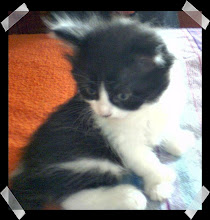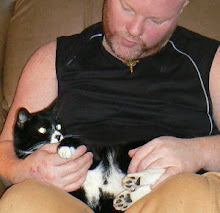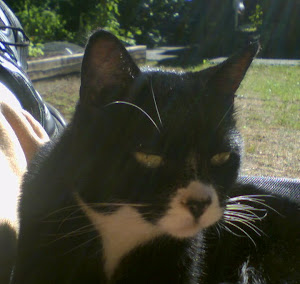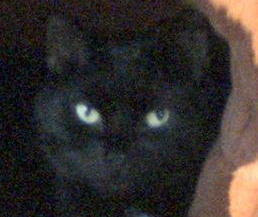Or at least like...
Once upon a time William Gibson posited the then-novel idea that human beings would spend most of their time jacked into computers. And guess what? In today’s post-post-cyberpunk world, we kind of do. More and more far-flung work teams work on complex projects with team members in outlying areas never meeting face-to-face. A growing educational trend reflects this shift with online classes and collaborative learning teams designed for working adults who never meet in the classroom, yet complete group assignments in entirely virtual environments. But whether you’re completing a project with someone in the next cubicle or with someone in China or with someone 20 miles away at another branch of the same organization, Writeboard is a great tool to know about.
Writeboard is a Web-based writing tool that allows teams (or individuals) to create and save multiple drafts of documents. Just from a teaching perspective, Writeboard looks like a good thing. It allows team members to write, revise, and share documents in real time, and it allows writers and contributors to compare different versions of a document and (presumably) agree on a final draft. For anyone who has ever had the frustrating experience of trying to read a Word document with revisions, or for anyone who has had his or her work edited with no “history” of the changes made, or even for employers or teachers wanting to evaluate multiple drafts and team input, Writepoint may be worth checking out.
On another note, Stikkit is a Web-based tool that gathers address books, tasks, memorandums, calendars, email, and more into one place. It does many of the things I currently do with Outlook (at work) and MSN (at home), but, since it’s Web-based like del.icio.us, it offers more convenient opportunities for using it from any location, rather than from just a work or personal computer. It also appears to have greater capabilities for tagging and organizing one’s life. Feeling disorganized? Then Stikkit may be worth a look.
Thursday, January 31, 2008
Tuesday, January 29, 2008
Tools a Librarian (or a Teacher) Could Love...
I just added two new applications—WorldCat and Easy Bibliography Generator—to my Facebook account, and I have just one thing to say: A-frickin’-mazing. Could I be more in love with this? No. Will I refer people to these applications? Yes. Consider yourselves my first refer-ees.
As many of you reading this will know, WorldCat is a comprehensive database allowing you to search for and find items in libraries all over the world. Here in the world of libraries, we already use WorldCat to find items that KRL doesn’t have. Now it seems like we could link this application to our library page in Facebook, making our site that much more vibrant for all those students and researchers out there in search of books. In case you’re worrying that it’ll send them to other libraries for books we have: not so much. It shows a list of owning libraries by proximity, starting with the closest library.
Easy Bibliography Generator is just what it sounds like. You plug in source information, and Easy Bibliographer Generator creates a properly formatted citation in any of a variety of citation styles, including MLA, Chicago Manual of Style, and even the dreaded and deeply stress-inducing APA style. (Yes, people, I teach a class at UOP that includes an intensive component on APA formatting, and it is evil. APA, I mean, not my class. Maybe the class, too. You’d have to ask my students.) Using this site, you can properly format bibliography entries for books, journals, Web sites, lectures, interviews, and more. For those of you referring patrons or students to style manuals, this is an outstanding tool to add to your repertoire.
As many of you reading this will know, WorldCat is a comprehensive database allowing you to search for and find items in libraries all over the world. Here in the world of libraries, we already use WorldCat to find items that KRL doesn’t have. Now it seems like we could link this application to our library page in Facebook, making our site that much more vibrant for all those students and researchers out there in search of books. In case you’re worrying that it’ll send them to other libraries for books we have: not so much. It shows a list of owning libraries by proximity, starting with the closest library.
Easy Bibliography Generator is just what it sounds like. You plug in source information, and Easy Bibliographer Generator creates a properly formatted citation in any of a variety of citation styles, including MLA, Chicago Manual of Style, and even the dreaded and deeply stress-inducing APA style. (Yes, people, I teach a class at UOP that includes an intensive component on APA formatting, and it is evil. APA, I mean, not my class. Maybe the class, too. You’d have to ask my students.) Using this site, you can properly format bibliography entries for books, journals, Web sites, lectures, interviews, and more. For those of you referring patrons or students to style manuals, this is an outstanding tool to add to your repertoire.
Friday, January 25, 2008
Here Be Dragons, or Be Careful What You Drink
Plus Musings on Twitter and the Language of Birds
There is an old Norse legend, perhaps best known through Wagner’s opera Siegfried, that he who drinks the blood of dragons will be gifted with the ability to understand the language of birds. In that legend, Sigurd (or Siegfried) slays the dragon Fafnir and then either bathes in and takes a celebratory chug-a-lug of his enemy’s blood or just accidently gets some blood in his mouth, depending on what folkloric version you favor. Either way, Sigurd doesn’t learn any pithy lessons about being careful what you put in your mouth, because he mostly gets a lot of helpful oracular advice from his feathered friends.
That said and Niebelung legends aside, perhaps my favorite representation of the dragon’s blood legend appears in Newbery Honor author Nancy Farmer’s wonderful blend of historical fiction and myth-inspired adventure, The Sea of Trolls, in which young Saxon Jack and his Viking captors encounter dragons, trolls, giant spiders, and more, when they embark on a series of adventures rooted in Norse legend. In Farmer’s representation, Viking berserker-initiate Jill becomes infected with dragon’s blood and discovers it’s a bit more of a mixed blessing than the story of Sigurd suggests. She learns that while the avian population might chirp up some good gossip, such as whether your enemies are massing over the next hill, mostly they just do a lot of what my dad used to call nattering and gromishing. That is to say, they talk a lot about very little.
So where am I headed with this? Well, Farmer’s musings on dragon’s blood and the language of birds provide as good a metaphor as any for the infamous social networking and micro-blogging service Twitter, currently under exploration for its value in the world of libraries.
While I see a certain potential value in Twitter as an up-to-the minute communication tool for far-flung and “virtual” work teams (virtual, that is, in the sense of teams working together in an online or virtual environment such as email, blogging, or twittering), Twitter can also represent a time and productivity drain for workplaces and a hotbed for missing and missed communications if not used properly or if too heavily or inappropriately relied upon as a communication tool. Still, keeping that concern in mind, there can be some big pluses for team Twittering. Just by way of example, while I was logged onto Twitter for krl2pt0 purposes I observed KRL Training Coordinator Bob Christensen’s of-the-moment update that he had posted new materials on the krl2pt0 site. Hmmm. Imagine if I were working on a time-sensitive project and looking for input from teammates. The entire work team could be instantly directed to Bob’s input and ideas even as he produced them. So… In a nutshell, Twitter strikes me as best designed for time-sensitive virtual team projects and committees. As far as the social aspect of Twitter goes, look no further than the metaphor of the birds to see what I think and whether I will use it that way.
Here Be Some Real Dragons: Bitterwood, by James Maxey
Maxey
On a dragon-related note, I recently finished an outstanding new entry in the dragon/fantasy/science fiction genre, Bitterwood, by genre newcomer James Maxey. Read my brief review here. Call me a sucker for well-crafted words, but I am a big fan of the dragons of J.R.R. Tolkien’s The Hobbit and Ursula K. LeGuin’s A Wizard of Earthsea, who are both fascinated by and distracted by a little well-honed argument—well, at least in the Aristophanic sense.* Maxey’s articulate, sometimes contemplative, and often rhetorically-driven dragons—particularly the ultra-evil “murder god” Blasphet—fit the bill perfectly. Then again, if you're like my husband and you prefer your dragons to stick with pillaging and carnage, Maxey offers a healthy portion of that, too. Maxey's slow unfolding of remnants of misunderstood and forgotten technology in a post-apocalyptic future landscape will also attract fans of Gene Wolfe’s Book of the New Sun and Book of the Long Sun, even as they remind us of the Arthur C. Clarke maxim that “Any sufficiently advanced technology is indistinguishable from magic.” (Starred review in Publishers Weekly and Booklist.)
*In his comedy Clouds, Aristophanes posits a Socratic School where young Greek youths learn rhetoric to argue the Wrong Argument and defeat the Right Argument. His characters attend this school to learn to argue their debts away, and comic mayhem ensues. My Point? Dragons, like Aristophanes' students in Clouds, are known to value argument for the sake of argument and as a means to justify questionable (often monetary) ends.
There is an old Norse legend, perhaps best known through Wagner’s opera Siegfried, that he who drinks the blood of dragons will be gifted with the ability to understand the language of birds. In that legend, Sigurd (or Siegfried) slays the dragon Fafnir and then either bathes in and takes a celebratory chug-a-lug of his enemy’s blood or just accidently gets some blood in his mouth, depending on what folkloric version you favor. Either way, Sigurd doesn’t learn any pithy lessons about being careful what you put in your mouth, because he mostly gets a lot of helpful oracular advice from his feathered friends.
That said and Niebelung legends aside, perhaps my favorite representation of the dragon’s blood legend appears in Newbery Honor author Nancy Farmer’s wonderful blend of historical fiction and myth-inspired adventure, The Sea of Trolls, in which young Saxon Jack and his Viking captors encounter dragons, trolls, giant spiders, and more, when they embark on a series of adventures rooted in Norse legend. In Farmer’s representation, Viking berserker-initiate Jill becomes infected with dragon’s blood and discovers it’s a bit more of a mixed blessing than the story of Sigurd suggests. She learns that while the avian population might chirp up some good gossip, such as whether your enemies are massing over the next hill, mostly they just do a lot of what my dad used to call nattering and gromishing. That is to say, they talk a lot about very little.
So where am I headed with this? Well, Farmer’s musings on dragon’s blood and the language of birds provide as good a metaphor as any for the infamous social networking and micro-blogging service Twitter, currently under exploration for its value in the world of libraries.
While I see a certain potential value in Twitter as an up-to-the minute communication tool for far-flung and “virtual” work teams (virtual, that is, in the sense of teams working together in an online or virtual environment such as email, blogging, or twittering), Twitter can also represent a time and productivity drain for workplaces and a hotbed for missing and missed communications if not used properly or if too heavily or inappropriately relied upon as a communication tool. Still, keeping that concern in mind, there can be some big pluses for team Twittering. Just by way of example, while I was logged onto Twitter for krl2pt0 purposes I observed KRL Training Coordinator Bob Christensen’s of-the-moment update that he had posted new materials on the krl2pt0 site. Hmmm. Imagine if I were working on a time-sensitive project and looking for input from teammates. The entire work team could be instantly directed to Bob’s input and ideas even as he produced them. So… In a nutshell, Twitter strikes me as best designed for time-sensitive virtual team projects and committees. As far as the social aspect of Twitter goes, look no further than the metaphor of the birds to see what I think and whether I will use it that way.
Here Be Some Real Dragons: Bitterwood, by James
 Maxey
MaxeyOn a dragon-related note, I recently finished an outstanding new entry in the dragon/fantasy/science fiction genre, Bitterwood, by genre newcomer James Maxey. Read my brief review here. Call me a sucker for well-crafted words, but I am a big fan of the dragons of J.R.R. Tolkien’s The Hobbit and Ursula K. LeGuin’s A Wizard of Earthsea, who are both fascinated by and distracted by a little well-honed argument—well, at least in the Aristophanic sense.* Maxey’s articulate, sometimes contemplative, and often rhetorically-driven dragons—particularly the ultra-evil “murder god” Blasphet—fit the bill perfectly. Then again, if you're like my husband and you prefer your dragons to stick with pillaging and carnage, Maxey offers a healthy portion of that, too. Maxey's slow unfolding of remnants of misunderstood and forgotten technology in a post-apocalyptic future landscape will also attract fans of Gene Wolfe’s Book of the New Sun and Book of the Long Sun, even as they remind us of the Arthur C. Clarke maxim that “Any sufficiently advanced technology is indistinguishable from magic.” (Starred review in Publishers Weekly and Booklist.)
*In his comedy Clouds, Aristophanes posits a Socratic School where young Greek youths learn rhetoric to argue the Wrong Argument and defeat the Right Argument. His characters attend this school to learn to argue their debts away, and comic mayhem ensues. My Point? Dragons, like Aristophanes' students in Clouds, are known to value argument for the sake of argument and as a means to justify questionable (often monetary) ends.
Labels:
dragons,
fantasy,
fiction reviews,
Juvenile fiction,
legend,
science fiction,
Twitter,
Web 2.0
Friday, January 18, 2008
I'm Ba-a-a-ack: What I Like about the Facebook (or Social Networking) Approach
I’m going to be blunt. Libraries have a reputation in the World-At-Large of “do it my way or hit the highway.” Hence, wholly for the worse, we have the unfortunate cultural image ingrained on our collective minds of the stiff-backed, cardigan-clad, tight-bunned librarian with pursed lips and flaming eyes, hissing out the age-old commandment of QUIET in the library.
(Just for the record, I don’t know any librarians like that. And I do know quite a few librarians.)
Now I’m going to be short and sweet. It’s because of that unfortunate and generally unjustified bad rep of libraries and librarians that I like the idea of Facebook (or other Social Networking) for Libraries. Facebook puts the library out there, where many of our patrons and patrons-to-be already are, telling our story, promoting our resources, offering our services, and most importantly opening a dialog about what the library can do for us, right now, TODAY. And it’s not about being quiet. In fact, it’s a conversation that anyone in our network or community can join, requesting titles, recommending books, asking about services or events—even finding out who else among our friends will be there. Facebook gives libraries an avenue to advertise what they do best, and it’s all about opening up, sharing, learning, entertainment, having fun, finding information, and engaging with the world in a whole variety of ways—be it with homework help, joining a book group, attending children’s story times, meeting (or promoting) your favorite author, tracing your family tree, finding a long-lost and well-loved book/story/movie through a purchase request or Interlibrary Loan. The list goes on and on. Facebook puts libraries in the community, in the world, and on the map. It’s not the only way to get our story out there, but it is one way among many, and let’s face it, it’s where a big ol’ segment of library users and future library users already congregate, so to speak. That said, the more library events, cool links, and discussion groups that spring up on the library Facebook page, the better. Let’s face it, it’s a win-win situation.
(Just for the record, I don’t know any librarians like that. And I do know quite a few librarians.)
Now I’m going to be short and sweet. It’s because of that unfortunate and generally unjustified bad rep of libraries and librarians that I like the idea of Facebook (or other Social Networking) for Libraries. Facebook puts the library out there, where many of our patrons and patrons-to-be already are, telling our story, promoting our resources, offering our services, and most importantly opening a dialog about what the library can do for us, right now, TODAY. And it’s not about being quiet. In fact, it’s a conversation that anyone in our network or community can join, requesting titles, recommending books, asking about services or events—even finding out who else among our friends will be there. Facebook gives libraries an avenue to advertise what they do best, and it’s all about opening up, sharing, learning, entertainment, having fun, finding information, and engaging with the world in a whole variety of ways—be it with homework help, joining a book group, attending children’s story times, meeting (or promoting) your favorite author, tracing your family tree, finding a long-lost and well-loved book/story/movie through a purchase request or Interlibrary Loan. The list goes on and on. Facebook puts libraries in the community, in the world, and on the map. It’s not the only way to get our story out there, but it is one way among many, and let’s face it, it’s where a big ol’ segment of library users and future library users already congregate, so to speak. That said, the more library events, cool links, and discussion groups that spring up on the library Facebook page, the better. Let’s face it, it’s a win-win situation.
Subscribe to:
Posts (Atom)



.jpg)





.jpg)




